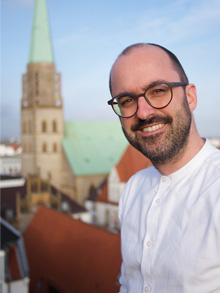Tipping the Scales of the Work-Life Balance

In 2017 the Chief Officer of Bielefeld’s Rheingans Digital Enabler, a consulting agency focusing on digitalization, trimmed employees’ workdays from eight hours to five. How did that experiment go?
Juggling work and life outside of work is a tedious challenge. We all try to allow ourselves time for fitness, errands, cooking, socializing and downtime, but often, it can’t all be fit in. It’s difficult to do with a 40-hour workweek. But alternative work models are becoming increasingly popular, particularly in Europe.
Based in Bielefeld, Rheingans Digital Enabler is a digital consulting agency that offers web-based products and services to help companies prepare for the future. They create websites and online shops, implement software solutions and train employees on topics like social media, automated marketing and the new world of work.
How appropriate then that Rheingans is a role model for a forward-thinking workplace. You might have seen their name in publications like the Wall Street Journal, Business Insider or Forbes. In 2017 their Chief Officer trimmed employees’ workdays from eight hours to five. Employees work from 8 AM to 1 PM five days a week. No overtime. No weekends. No pay cut. Though intended as an experiment, Rheingans has maintained the policy.
Sure, there were growing pains. To implement the new work schedule, inefficiencies had to be cut out— obvious things like idle chat, breaks, message alerts and waiting for feedback from colleagues. But the experiment also highlighted larger structural inefficiencies.

“Poor communication, nonsensical processes, and workstations that were simply not optimally equipped became apparent,” said Lasse Rheingans, the company’s Chief Officer. “Some employees were unable to deal with their workload within five hours. However, in my view, and in the opinion of my project managers, that had less to do with the employees themselves and more to do with the fact that their workload was already too heavy.”
Such work models are gaining increased popularity. For more than twenty years France has maintained a standard 35-hour work week. The Netherlands boasts the lowest working hours of any industrialized nation at an average 29 hours weekly. And in 2017 Sweden began experimenting with six-hour workdays.
By and large, no sweeping action is coming along to revolutionize the hours we work. The changes are slow and being approached with skepticism. But the view toward new work models reveals a broader cultural trend: more people are looking outside of work for their sense of purpose and fulfillment.
More about Rheingans Digital Enabler at https://digitalenabler.de/
